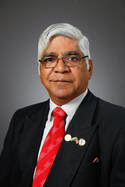 Blog author, Dr. K Ganapathay is a Past President of the Telemedicine Society of India, Neurological Society of India & Indian Society for Stereotactic & Functional Neurosurgery. Emeritus Professor, Tamilnadu Dr MGR Medical University, he has 43 YEARS of clinical experience. He is on the Board of Directors of Apollo Telemedicine Networking Foundation and Apollo Telehealth Services – the largest and oldest multi specialty telehealth network in South Asia, an Advisory Board member of InnovaSpace, and recognised as a staunch advocate par excellence in promoting telehealth. For more details see www.kganapathy.com. I am thankful to Prof. Thais Russomano, Space doctor, for rekindling my dormant interest in outer space. 11 years ago I started taking my grandson to the terrace in my house and repeatedly showed him the moon and said "I want you to work there as a doctor". Who knows? This may actually happen in my life time.
As a 'Made in India', totally indigenous product, who has worked only in India, I am absolutely thrilled to learn about INDIA’S FIRST MANNED SPACE MISSION - Gaganyaan, scheduled for launch in December 2021. 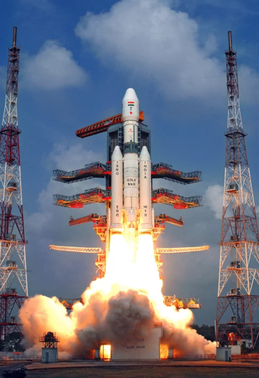 GSLV Mk III Lift Off Image: ISRO GSLV Mk III Lift Off Image: ISRO The mission, which was announced by Prime Minister Narendra Modi in his Independence Day speech, is set to be a turning point in space history, as it will make India one of only four countries in the world, after Russia, USA and China, to launch a manned space flight. The plan involves sending three Indians into space for 5 to 7 days on a Low-Earth-Orbit mission (altitude of 300-400 km). At 27,000 km/h, a spacecraft completes an orbit around the Earth every 90 minutes. Costing within 1.5 billion US$, this 40-month project will employ 15,000 individuals, including 13,000 from industries and 1,000 from academic institutes – and of course, Indians!! Vyomanuts (Indian astronauts) for this mission are likely to be selected from 200 shortlisted Indian Air Force pilots, with just 4 being selected and trained. The best among the superhuman test pilots will get the golden ticket. On the seventh day after launch, the crew module will re-orient and separate itself from the service module, landing on Earth within 36 minutes, in the Arabian Sea, close to Ahmedabad. 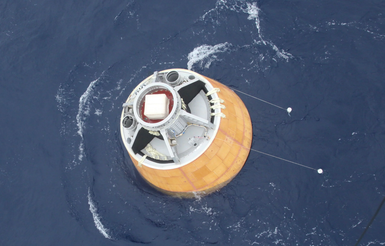 Crew module splash down Image: ISRO Crew module splash down Image: ISRO One of the six largest space agencies in the world with the largest fleet of communication (INSAT) and remote sensing (IRS) satellites, ISRO has already developed most of the technologies required for manned flight. In 2018, it performed a Crew Module Atmospheric Re-entry Experiment and Pad Abort Test for the mission, while the Defence Food Research Laboratory (DFRL) has already worked on producing space food, and has been conducting trials on astronaut G-suits Most governments are averse to taking risks. It is a sign of the times that a popular government, in an emerging economy is willing to invest effort, time and money in what would, as a knee jerk response by many, be considered “preposterous”. One has to have the foresight that early investments in space would indeed be a differentiator. There are incredible resources out there. The moon has sufficient helium to power the entire globe. We will soon have an energy crisis and we are depleting all of our resources here on Earth. Whoever controls the valuable resources found in space will perhaps control the world. Unless goals are set, we will never get there. As the late chairman of ISRO Prof. U R Rao once remarked “...a government’s approach is to avoid all failures, but sometimes we need failures to push the boundaries”. Space law (spearheaded by the US) at present mandates that the natural resources found in space can be owned but not the place itself — like catching fish at sea. This has encouraged the pursuit of space business and millions of dollars have come in from private players. Today, if one finds a rock with valuable materials (precious metals like gold/platinum), it is yours. India is indeed a paradox. We have centres of excellence better than the best. We no longer talk of achieving world class, and indeed, in several disciplines, the world talks of achieving India class! It is true that we have a long long way to go. Internationally, an income of less than $1.90 per day per head of purchasing power parity is defined as extreme poverty. By this estimate, about 12% to 15% of 1.3 million Indians are extremely poor. Are we justified in denying millions of people good drinking water to satisfy an “ego trip”? In my view the answer is a resounding Yes. How else would you explain a billion plus mobile phones in the country. We are in a stage of transition. As Lloyd C Douglas remarked “this too will pass”. The future is always ahead of schedule. The Gaganyaan mission when (not if !) successfully executed will have untold spin-offs impossible to quantitatively qualify. It will show every one of us, that the ISRO culture of meritocracy can be imbibed by everyone, that minute attention to the nitty gritty in everyday life is doable, that failure is not an option. 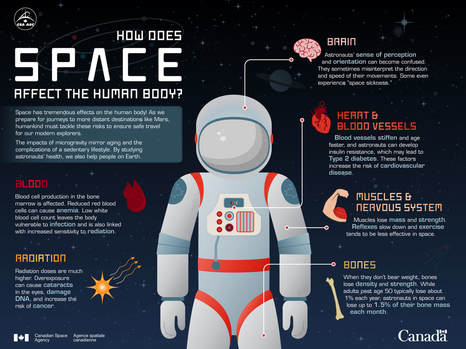 Image: Canadian Space Agency Image: Canadian Space Agency Manned space missions do pose health risks pre-, during and post-flight for crew members onboard a spacecraft or station. There are communication challenges for medical doctors monitoring them from the ground. Physical and mental changes related to adaptation to the space environment need to be monitored in real-time. Changes in clinical parameters and management of unexpected medical emergencies need to be addressed and prepared for. Removing the effect of Earth's gravitational force alters all organic functioning. Space motion sickness, characterised by impairment of performance, nausea, vomiting and a diffuse malaise, occurs in astronauts and lasts for the first 72 hours of a space mission. Normal process of bone formation and resorption is disturbed. All of these aspects still require further study and understanding, and perhaps the Gaganyaan mission can also inspire and motivate Indian researchers to address these issues. For the last few years in all my talks I have been mentioning that India no longer follows the West. We no longer piggy back. We don’t even leap frog. After all how much can a frog leap! We pole vault!! A few years ago, President Obama warned American doctors that if they “don’t wake up” more Americans will start going to India for health care because it is cheap there. Indian doctors protested. They said in one voice “Mr. President, they don’t come to India to save a few thousand dollars. They come to India because our outcomes are as good as any of your hospitals. We are inexpensive not cheap!! 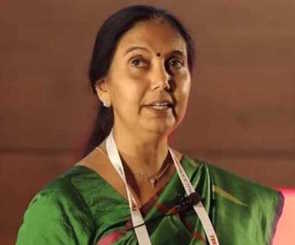 Just one more comment of interest... Dr. K. Sivan, Chairman ISRO, within hours of the Prime Minister’s announcement, disclosed the appointment of Dr. Lalithambika as the first Director of ISRO’s Human Space Programme. Going by the number of women in top positions at ISRO, it is obvious that, if there is gender discrimination at all, it is of the reverse type!! Speaks volumes that Indian women are second to none . Comments are closed.
|
Welcometo the InnovaSpace Knowledge Station Categories
All
|
InnovaSpace Ltd - Registered in England & Wales - No. 11323249
UK Office: 88 Tideslea Path, London, SE280LZ
Privacy Policy I Terms & Conditions
© 2024 InnovaSpace, All Rights Reserved
UK Office: 88 Tideslea Path, London, SE280LZ
Privacy Policy I Terms & Conditions
© 2024 InnovaSpace, All Rights Reserved
 RSS Feed
RSS Feed